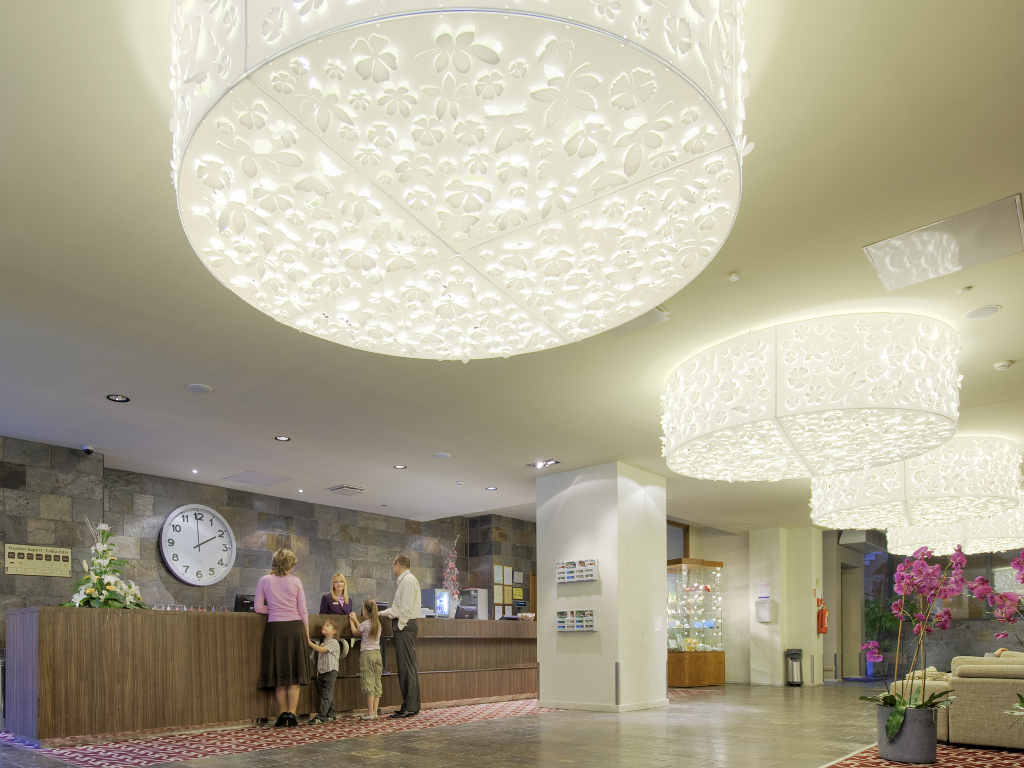Does Serbia have too many stars? – Tourist destinations lack lower category hotels
In the past few years, Serbia has become an increasingly attractive tourist destination for international hotel chains, but also for local investors. By the end of the year, Novi Sad will get a Sheraton, whereas Belgrade expects the opening of Mama Shelter in Rajiceva and Hotel Hilton in 2018.
Local investors, who have been growing stronger and planning new investments for years, are not lagging behind global chains either. The focus is on high-category hotels, whereas experts remind that an even development also requires hotels with three and fewer stars. “Fewer stars doesn’t mean bad service – good service is a given”, they remind. Experts agree that, aside from lower category hotels, Serbia also needs a new system of categorization, such as is up to date with modern tendencies, and the implementation of modern ways of evaluation, such as “a mysterious guest”.
According to the Ministry of Tourism, there are 340 hotels in Serbia, of which 227 “standard” ones, 107 bed-and-breakfast hotels and 6 apartment hotels. The total number of accommodation units in these facilities amounts to around 17,000, whereas the number of beds equals 27,835.
Of those, 114 hotels have four stars and a total of nine hotels have five stars (four in Belgrade, two in Novi Sad and one each in Arandjelovac, Vrdnik and Sremski Karlovci). A total of 127 hotels have three stars, 74 have two and 15 hotels have one star. Each hotel is rated within the regulations adopted by the relevant ministry.
The Ministry of Tourism explains for eKapija that the facility rating standards are the requirements and the criteria in terms of development and equipment, service quality, predominant features and facility maintenance. Among other things, the elements that are rated include the exterior of the hotel, the front desk, the presence of elevators, spa centers, pools, sports and other features.
– The system of categorization of hospitality facilities for accommodation in Serbia is harmonized with the rating and quality standard systems Hotel Stars and HOTREC (Hotels, Restaurants & Cafes), implemented by the majority of the countries of the region and the EU – the Ministry of Tourism emphasizes.
The competent tourism inspection, which carries out supervision of service provision in hospitality facilities, takes care that the standards are met.
– Tourism inspectors perform regular control of service provision in hospitality facilities and, in addition to that, they carry out extraordinary supervision if customer dissatisfaction is indicated. By this September, tourism inspectors carried out a total of 180 instances of control of hotel operations, 12 of which were carried out based on complaints by citizens.
The ministry adds that, for a number of years now, the sector of tourism inspection has been receiving a remarkably small number of complaints by dissatisfied customers.
Local investors, who have been growing stronger and planning new investments for years, are not lagging behind global chains either. The focus is on high-category hotels, whereas experts remind that an even development also requires hotels with three and fewer stars. “Fewer stars doesn’t mean bad service – good service is a given”, they remind. Experts agree that, aside from lower category hotels, Serbia also needs a new system of categorization, such as is up to date with modern tendencies, and the implementation of modern ways of evaluation, such as “a mysterious guest”.
According to the Ministry of Tourism, there are 340 hotels in Serbia, of which 227 “standard” ones, 107 bed-and-breakfast hotels and 6 apartment hotels. The total number of accommodation units in these facilities amounts to around 17,000, whereas the number of beds equals 27,835.
Of those, 114 hotels have four stars and a total of nine hotels have five stars (four in Belgrade, two in Novi Sad and one each in Arandjelovac, Vrdnik and Sremski Karlovci). A total of 127 hotels have three stars, 74 have two and 15 hotels have one star. Each hotel is rated within the regulations adopted by the relevant ministry.
The Ministry of Tourism explains for eKapija that the facility rating standards are the requirements and the criteria in terms of development and equipment, service quality, predominant features and facility maintenance. Among other things, the elements that are rated include the exterior of the hotel, the front desk, the presence of elevators, spa centers, pools, sports and other features.
– The system of categorization of hospitality facilities for accommodation in Serbia is harmonized with the rating and quality standard systems Hotel Stars and HOTREC (Hotels, Restaurants & Cafes), implemented by the majority of the countries of the region and the EU – the Ministry of Tourism emphasizes.
The competent tourism inspection, which carries out supervision of service provision in hospitality facilities, takes care that the standards are met.
– Tourism inspectors perform regular control of service provision in hospitality facilities and, in addition to that, they carry out extraordinary supervision if customer dissatisfaction is indicated. By this September, tourism inspectors carried out a total of 180 instances of control of hotel operations, 12 of which were carried out based on complaints by citizens.
The ministry adds that, for a number of years now, the sector of tourism inspection has been receiving a remarkably small number of complaints by dissatisfied customers.
– There are very few complaints regarding failure to adhere to proscribed standards for the approved rating. This year, we’ve only had three such complaints, two of which were determined by inspection supervision to have been founded. The remaining complaints pertained to issuing bills, not meeting proscribed minimal technical requirements, level of heating in rooms or toilet hygiene in rooms.
“Mysterious guest” popular globally, not in Serbia
Secretary of the Association of Tourism at the CCIS, Tijana Maljkovic, says for eKapija that accommodation rating standards should be adapted to trends, considering the technological innovations and innovations in communications, as well as the modernization of the entire industry.
– This primarily pertains to the introduction of the 3 superior and 4 superior star rating. This would generally make standards across categories stricter and implement a new price policy. The rating in Serbia is renewed every three years, but that too should be adapted and modified by introducing a two-year renewal period, but also annual evaluation – she adds.
Our interviewee reminds that most countries in the world have annual evaluation performed thanks to the so-called “mysterious guest”, who stays at a hotel and rates all its services.
– The mysterious guest provides negative or positive assessment from an angle of a common guest through their experience – from the booking, through the accommodation, food, room service, pools, to spa centers and other features. This kind of evaluation has not yet been officially adopted here, although there’s truly a great need for it. Even representatives of hotel management are interested in this type of rating, and there’s also an initiative originating with the Business Association of Hotel and Restaurant Industry HORES – Maljkovic explains.
Fewer stars perceived as shameful
According to our interviewee, a stronger inspection and implementation of categorization is needed in mountain resorts in Serbia, whereas Belgrade, as the capital of Serbia, lacks good three-star hotels.
That this is the case in the whole of Serbia is also the belief of Bojan Zecevic, professor of tourism economics and marketing at the Faculty of Economics.
“Mysterious guest” popular globally, not in Serbia
Secretary of the Association of Tourism at the CCIS, Tijana Maljkovic, says for eKapija that accommodation rating standards should be adapted to trends, considering the technological innovations and innovations in communications, as well as the modernization of the entire industry.
– This primarily pertains to the introduction of the 3 superior and 4 superior star rating. This would generally make standards across categories stricter and implement a new price policy. The rating in Serbia is renewed every three years, but that too should be adapted and modified by introducing a two-year renewal period, but also annual evaluation – she adds.
Our interviewee reminds that most countries in the world have annual evaluation performed thanks to the so-called “mysterious guest”, who stays at a hotel and rates all its services.
– The mysterious guest provides negative or positive assessment from an angle of a common guest through their experience – from the booking, through the accommodation, food, room service, pools, to spa centers and other features. This kind of evaluation has not yet been officially adopted here, although there’s truly a great need for it. Even representatives of hotel management are interested in this type of rating, and there’s also an initiative originating with the Business Association of Hotel and Restaurant Industry HORES – Maljkovic explains.
Fewer stars perceived as shameful
According to our interviewee, a stronger inspection and implementation of categorization is needed in mountain resorts in Serbia, whereas Belgrade, as the capital of Serbia, lacks good three-star hotels.
That this is the case in the whole of Serbia is also the belief of Bojan Zecevic, professor of tourism economics and marketing at the Faculty of Economics.
– If you look at how certain local investors and hotel owners act, the question of the number of stars of the hotels they’re building is often tied to their own identities. Namely, having a hotel with under four stars is perceived as shameful and not fitting the reputation the owner desires for themselves. Hotel development is thereby not seen from a purely business aspect, as an investment which should make a satisfactory profit, but as a mirror of one’s own personality and proof of one’s own success. Of course, it would be a mistake to believe that this is the case in Serbia only. This sort of approach is present throughout the world, but it is luckily rarer. The economic logic prevails there – the professor explains for eKapija.
He reminds that it would be useful to make the accommodation offer throughout Serbia more complete by having hotels with one, two or three stars.
– Let’s not forget that fewer stars doesn’t mean that the service is of lower quality. The key criterion of any and all types of hotels has to be good service. In the age of the internet, the final guest rating is publically available to everyone and is the final indicator of a hotel’s performances in the long term.
Professionals from the field agree that, even with the big expansion of the tourism industry in Serbia, the country doesn’t have enough accommodation capacities. Investors often give up on new investments due to infrastructural problems. Some towns and municipalities, for example, do not even have a single hotel in their territory.
Tijana Maljkovic says that, when it comes to promising tourist destinations, additional capacities are primarily needed in Stara Planina, whereas spas need to be categorized by capacity into medical tourism and wellness and spa. She also notes that numerous resorts, cultural and historical goods are not available for group visits, as they lack adequate bus access.
Sanja Sojic
He reminds that it would be useful to make the accommodation offer throughout Serbia more complete by having hotels with one, two or three stars.
– Let’s not forget that fewer stars doesn’t mean that the service is of lower quality. The key criterion of any and all types of hotels has to be good service. In the age of the internet, the final guest rating is publically available to everyone and is the final indicator of a hotel’s performances in the long term.
Professionals from the field agree that, even with the big expansion of the tourism industry in Serbia, the country doesn’t have enough accommodation capacities. Investors often give up on new investments due to infrastructural problems. Some towns and municipalities, for example, do not even have a single hotel in their territory.
Tijana Maljkovic says that, when it comes to promising tourist destinations, additional capacities are primarily needed in Stara Planina, whereas spas need to be categorized by capacity into medical tourism and wellness and spa. She also notes that numerous resorts, cultural and historical goods are not available for group visits, as they lack adequate bus access.
Sanja Sojic
Companies:
Ministarstvo turizma i omladine Republike Srbije
Privredna komora Srbije
Udruženje za turizam PKS
Turistička organizacija Srbije Beograd
Ekonomski fakultet Beograd
HORES Beograd
Tags:
Share:






Only logged-in users can comment.


 Izdanje Srbija
Izdanje Srbija Serbische Ausgabe
Serbische Ausgabe Izdanje BiH
Izdanje BiH Izdanje Crna Gora
Izdanje Crna Gora


 News
News









 LinkedIn
LinkedIn Copy link
Copy link




